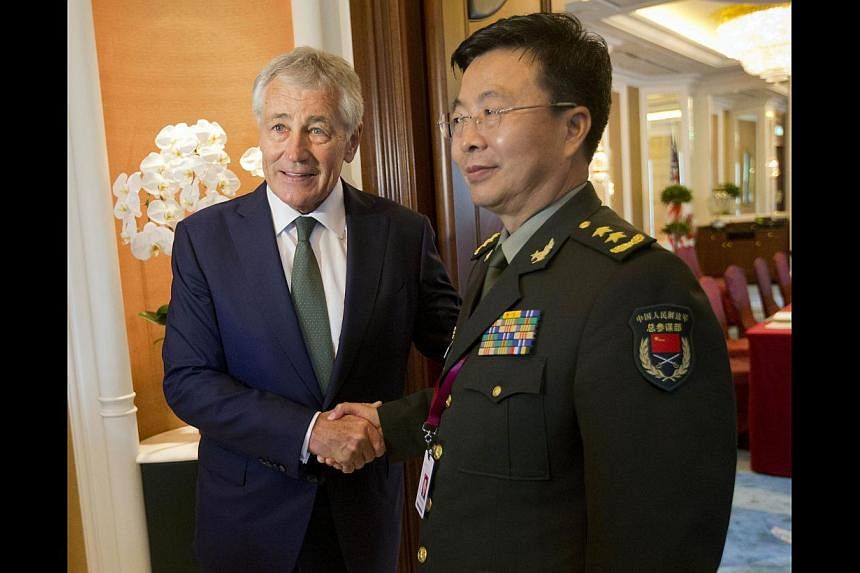Speaking at the Shangri-La Dialogue last week, Lieutenant-General Wang Guanzhong dropped a proverbial bomb in the Island Ballroom.
Halfway through his 38-minute speech, the deputy chief of general staff of the People's Liberation Army (PLA) accused Japanese Prime Minister Shinzo Abe and United States Secretary of Defence Chuck Hagel of "coordinating" and "supporting" one another in comments targeted at China. Lt-Gen Wang said that such US-Japan collusion was "unimaginable" and went against the spirit of constructive exchanges at the dialogue.
In his keynote address last Friday, Mr Abe had criticised China - albeit indirectly - for consolidating changes "to the status quo by aggregating one fait accompli after another".
Speaking hours before Lt-Gen Wang on Saturday, Mr Hagel decried China's "destabilising, unilateral actions (in) asserting its claims in the South China Sea".
In addition to slamming China's behaviour in the South China Sea, Mr Hagel stressed that the US would remain primus inter pares in the Asia-Pacific. This was in direct opposition to China's view, which wants a regional order for Asians by Asians - a position seen to exclude the United States.
In recent months, regional tensions have involved China, be it Beijing's tussle with the Philippines and Vietnam over disputed features in the South China Sea, or its confrontation with Japan over the Senkaku/Diaoyu islands. More recently, the US has accused China of cyber espionage of industrial secrets.
Moreover, the debates at the dialogue brought into sharp relief pressing regional issues. They should help beat the path to some degree of resolution.
In his keynote speech, Mr Abe said that Japan would play a bigger security role in the region, by amending its Constitution so that Japan could come to the aid of its ally, the United States. Tokyo would also be sending coast guard ships to the Philippines to enhance the "security of the seas" (read: against Chinese intrusions).
Unsurprisingly, some Chinese delegates were shifting uncomfortably in their seats as Mr Abe spoke.
But it is probably true to say that apart from China and South Korea, many countries in the Asia-Pacific do not have major problems with Japan playing a role in regional security.
In his address, Lt-Gen Wang gave the clearest exposition of China's controversial nine-dashed line claim to the South China Sea.
China, he said, discovered the islands in the South China Sea as early as the Han Dynasty; the nine-dashed line was drawn and declared in 1948, 46 years before 1994, when the United Nations Convention on the Law of the Sea (Unclos) was ratified. Moreover, Unclos has no retrospective effect. He added an extra sting in his bite - the US has not ratified Unclos.
It is generally accepted that the nine-dashed line is not consistent with Unclos, the gold standard for assessing disputed claims to maritime areas. But China's clearer position on the nine-dashed line should add impetus to the conclusion of talks for a binding Code of Conduct for the South China Sea, which would at the least enshrine norms of behaviour.
On another front, some serious pressure was brought on Japan to admit that Tokyo has a dispute with Beijing over the Senkaku/ Diaoyu islands, and consequently should take it to third-party arbitration.
Eric Li, the managing director of Shanghai-based Chengwei Capital, lauded Japan's "elegant" position on the islands - while Tokyo was all for the rule of law in the resolution of disputes, Tokyo maintained that the Senkaku islands were not in dispute. As a result, the rule of law did not apply. "Congratulations," he told Mr Shinsuke Sugiyama, Japan's Deputy Minister for Foreign Affairs, with a touch of sarcasm.
The over-arching theme of the dialogue, however, was the competing narratives between China and the United States about America's role in the region.
Both China and the US are working hard to elude the Thucydides Trap, whereby an emerging power clashes with a status quo power. In June last year, Chinese President Xi Jinping and US President Barack Obama crafted a "new model of great power relations" that sought to mitigate the tensions in their relationship. More significantly, the US has invited the PLA Navy to participate in the Rim of the Pacific maritime warfare exercises slated to commence later this month.
Away from the public glare, Mr Hagel and Lt-Gen Wang had a "cordial and constructive" meeting on the sidelines of the dialogue, Pentagon officials said. Both men agreed that both countries would work to achieve a new model of relations. Said Lt-Gen Wang: "It's only natural that we have differences… it's not something to be feared."
There were also notable proposals to improve regional security. Dr Dino Patti Djalal, a top Indonesian diplomat, said that Asean should use "positive brinkmanship" or a harder approach to achieve outcomes such as the South China Sea Code of Conduct. Mr Abe suggested that regional countries disclose their military budgets to boost the standing of the East Asia Summit.
The dialogue also saw increased interest from the media. Phoenix Television, a Hong Kong-based network with 400 million viewers in China, hosted a live debate involving diplomats and politicians from Singapore, China, the US and India.
Summing up, Singapore Defence Minister Ng Eng Hen acknowledged that there were some emotionally charged moments.
Still, he said that it was better to "trade hard words than other things that follow".
Indeed, the gloves were off at the dialogue this year. But it is better that the boxing and bouting is done in the Island Ballroom rather than on Asia's high seas.
stopinion.sph.com.sg
The writer, a former Straits Times journalist, is a Shangri-La Dialogue Senior Fellow at the International Institute for Strategic Studies, the think-tank which organises the annual dialogue.

